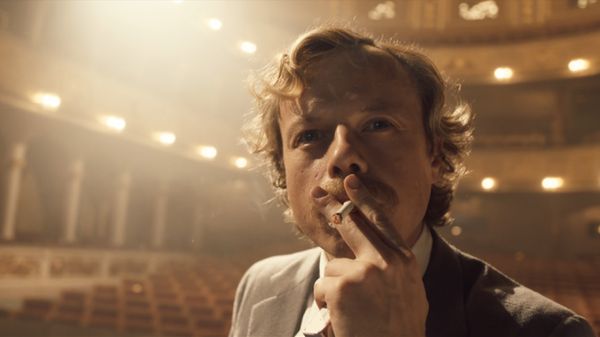Eye For Film >> Movies >> Havel (2020) Film Review
Havel
Reviewed by: Amber Wilkinson

Wreathed in cigarette smoke and with an eye for the personal, this Czech TV biopic of playwright-turned-president Vaclav Havel is aiming for broad strokes and a broad audience and, by and large, succeeds on its own terms. After a brief prologue, it enters the life of Havel (Viktor Dvorák) in the Warsaw Pact invasion era of 1968, before concentrating on the Seventies, finally taking us to 1989 and the Velvet Revolution that led to him becoming the first post-Communist leader of the Czech Republic. Writer/director Slávek Horák and his co-writer Rudolf Suchánek aren't simply interested in burnishing Havel's legacy, but in getting under the skin of the man who, though he might have had a strong moral sense of duty in some areas, also had plenty of personal flaws, especially when it came to relationships.
If Havel's increasing involvement in the artistic community's resistance against Communism drives the film, there is still considerable weight given to his relationship with his wife Olga (Anna Geislerová), who not only had to put up with his dalliances with other women but his irritating habit of insisting on informing her of his affairs. "Couldn't you just, for once, not tell me?" she asks in the first of many stringent exchanges they will have about fidelity down the years. Horák keeps the action moving swiftly along as Havel becomes involved with the signing and promulgating of Charter 77, which attacked the Czechoslovak government for bending to the Soviet's will and failing to uphold human rights.

Pens and paper become a repeated challenge for him - both in terms of his writing and with regard to statements the government wants him to make, early compromises that will prick his conscience for what is to come. The Seventies mood is also maintained through the film's look and costuming, that chiefly stick to the subdued brown and beige end of the spectrum and are further subdued by the cigarette smoke that seems to hang permanently in the air.
Dvorák is well cast in the central role, couching Havel's charm and general enthusiasm with an air of uncertainty, especially when he faces tough choices and the loss of his freedom. The actor retains the aura of an unlikely hero even as he becomes increasingly politicised and Jan Stastný often hunkers in close to him, so we focus on his every thought. Structurally, the film plays with the idea of the man and the playwright by cutting away from the action to a stage at key moments - a device that, if anything, would have been welcome if used a bit more. Less successful is a repeated motif focusing on the idea of him taking a step forward or backward, which is just a bit too on the nose. This may not be chapter and verse of Havel's life but it certainly gives a feel for the man and his motivations, while ensuring that other key figures in his life, from Olga, to his actor friend Pavel Landovský (Martin Hofmann) and long-term lover Anna Kohoutová (Barbora Seidlová) aren't reduced to mere footnotes.
Reviewed on: 29 Oct 2020
















